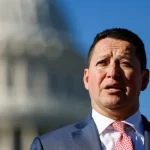
With the Moore v. Harper Supreme Court ruling, an invaluable tool may have just emerged that can reshape the abortion fight.
The court has reclaimed its own constitutional duty to provide judicial review of state laws:
“When a state legislature carries out its federal constitutional power to prescribe rules regulating federal elections, it acts both as a lawmaking body created and bound by its state constitution, and as the entity assigned particular authority by the Federal Constitution. Both constitutions restrain the state legislature’s exercise of power.”
This decision may have opened up some unexpectedly interesting possibilities for placing federal restraints on the permission awarded by Dobbs v. Jackson to pro-abortion states to legislate unfettered access to abortion.
Back in June 2022, the Supreme Court ruled in Dobbs that there was no constitutional guarantee of any right to get an abortion: “Procuring an abortion is not a fundamental constitutional right because such a right has no basis in the Constitution’s text or in our Nation’s history.”
Trending:
So the issue of abortion “rights” was sent back to state lawmakers and judges.
No “exclusive and independent authority in state legislatures to set the rules”
But now, the Supreme Court seems to be reasserting its own “authority to invalidate [state] laws that violate the Federal Constitution.”
The ability of states to do their own thing regarding federal elections “does not vest exclusive and independent authority in state legislatures to set the rules.” Logically, this caveat would appear to apply across the board and should cover abortion rules as well as electoral ones.
Does the Constitution protect the rights of the unborn?
Yes: 0% (0 Votes)
No: 0% (0 Votes)
The focus of the abortion battle may have shifted dramatically once again.
Whether on election rules or abortion rules, state legislatures can’t ignore the Constitution or evade Supreme Court review.
So what protections against abortion are provided in the Constitution?
In Dobbs, the Supreme Court decided that there is no right to get an abortion enshrined in the Constitution. But the court made no pronouncement on whether the Constitution’s right to life and equal protection clauses cover those smallest human beings targeted for abortion.
Fortuitously, the Dobbs decision did acknowledge the “ample evidence” that the passage of laws protecting the unborn from abortion was “spurred by a sincere belief that abortion kills a human being. Many judicial decisions from the late 19th and early 20th centuries made that point.”
Historically, prohibitive abortion laws recognized the unborn as human beings.
At the time of the drafting of the Constitution, James Wilson, signer of both the Declaration of Independence and the Constitution, clearly confirmed that “human life, from its commencement to its close, is protected by the common law.”
Given that Wilson was one of the original justices appointed by George Washington to the Supreme Court, it was presumptuous of a Supreme Court majority in Roe v. Wade to reject as “unconstitutional” the common law protection of the natural rights of the infant in the womb that Wilson had affirmed in his lectures, “Of the Natural Rights of Individuals” (1790).
At the time when the Declaration and the Constitution were being drafted, William Blackstone’s “Commentaries” was the preeminent legal authority among American scholars and practitioners of the law.
Blackstone was the definitive source of common law cited by American courts at that time. Professor Robert Ferguson in “Law and Letters in American Culture” (1984) has shown that all of the nation’s formative documents — the Declaration, the Constitution, the Federalist Papers and the seminal decisions of the Supreme Court under Chief Justice John Marshall — were drafted by attorneys steeped in the legal concepts of the “Commentaries.”
The “Commentaries” identified in law the category of natural persons, which includes “the infant stirring in the mother’s womb.” Today’s embryologists and fetologists are able to empirically track that original concept of active and purposeful “stirring” — the lively, continuous flourishing of a baby in the womb.
“We, the People” are the government, and the government has a solemn responsibility to protect “our Posterity” from arbitrary deprivation of life. Even the smallest and most defenseless in what Abraham Lincoln called “the whole great family of man” has a right to life and the blessings of liberty.
Abolition of abortion — “an act of justice warranted by the Constitution”
Back in 1988, President Ronald Reagan issued a proclamation saying that the protection of innocents must be guaranteed and the personhood of the unborn be declared and defended throughout the land. Reagan proclaimed:
“The unalienable right to life is found not only in the Declaration of Independence but also in the Constitution that every President is sworn to preserve, protect, and defend. Both the Fifth and Fourteenth Amendments guarantee that no person shall be deprived of life without due process of law.”
Like Lincoln’s Emancipation Proclamation, Reagan’s proclamation was presented as “an act of justice, warranted by the Constitution.”
“I, Ronald Reagan, President of the United States of America, by virtue of the authority vested in me by the Constitution and laws of the United States, do hereby proclaim and declare the unalienable personhood of every American, from the moment of conception until natural death. … Upon this act, sincerely believed to be an act of justice, warranted by the Constitution, I invoke the considerate judgment of mankind and the gracious favor of Almighty God.”
Reagan was only reaffirming a long-established truth.
In 1818, Chief Justice Marshall put on the record that in the Constitution there can be no lawful distinction between human beings and persons: “The words ‘any person or persons’ are broad enough to comprehend every human being. … The words ‘any person or persons’ comprehend the whole human race” (United States v. Palmer).
So, when the U.S. Constitution and many state constitutions proclaim the right to life and the right to equal protection under the law, those rights are still highly relevant to the legal protection of our smallest human beings.
To deny legal protection to the unborn child targeted for abortion is not consistent with the constitutional protections set out in the Fifth Amendment and implicit in the 14th Amendment.
When individual states renege on that legal protection, they must be subjected to judicial review.
The views expressed in this opinion article are those of their author and are not necessarily either shared or endorsed by the owners of this website. If you are interested in contributing an Op-Ed to The Western Journal, you can learn about our submission guidelines and process here.






